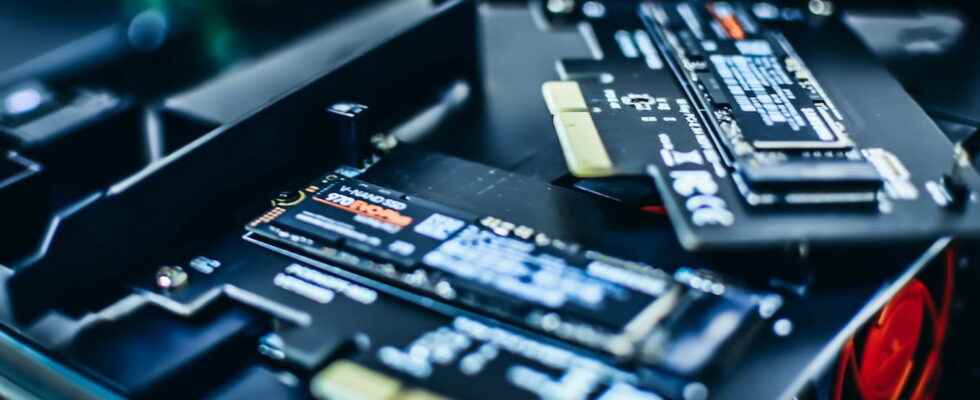If you have an SSD in your PC, remember to update its firmware: this firmware can indeed evolve and make you gain in performance and reliability. Here’s what you need to know to carry out this fairly simple operation.
SSDs are handy storage devices. Silent, light, very resistant to shocks and, above all, ultra fast, they advantageously replace the fragile, heavy, noisy and slow hard drives of yesteryear, with their magnetic platters. Now installed as standard in all new PCs, they also represent a very good investment to refresh an aging computer at a lower cost. Today, there are SSDs with a capacity of 1 TB for less than 80 euros (but be careful not to get ripped off with fake disks as we explain in our article).
To function properly, an SSD requires a driver in order to be properly supported by the operating system as well as firmware or firmware. The latter, designed by the manufacturer of the SSD, is stored in a chip inside the disk. It defines disk behaviors, memory cell management, throughputs, etc. And like any other component, it can benefit from updates deployed by its manufacturer. It can be to improve the performance of the device, to correct a security vulnerability or to solve a design problem.
However, if Windows takes care – sometimes – to update hardware drivers, firmware updates completely escape it. And depending on whether or not your PC includes a utility provided by its manufacturer (Asus, Acer, Dell, HP, etc.) you can completely miss out on an important SSD firmware update. The case also inevitably occurs if you yourself have exchanged the original hard disk of the PC for the benefit of an SSD or which you have assembled your own machine by choosing its components. To be sure, the main suppliers of SSDs offer a utility to check for the existence of an update and, if necessary, to apply it. You still need to know the brand and model of the SSD installed in the PC. Here’s how to do it without making mistakes.
To know precisely the brand and model of your SSD – and even the firmware version it uses – a small free utility will inform you: CrystalDiskInfo.
► Start by repatriating CrystalDiskInfo on your PC. This is a portable version so it does not need to be installed.
Download CrystalDiskInfo for Windows
► Launch the software. After a few seconds, disc information is displayed. In our example, it is an Intel NVMe 500 GB model. The firmware version is also specified in the first field.
► Our PC has a second 500 GB SSD as well. It is marked with CrystalDiskInfo at the top of the window. This is a Crucial MX500 model. The firmware version is also mentioned.
► Armed with these three pieces of information, searching if there is a firmware update for the SSD becomes easy.
You were able to identify the brand and model of SSD installed in your PC. Now all that remains is to check if it has received a firmware update. For this, most manufacturers offer a utility responsible for checking the health of the disk and the availability of updates.
► To proceed with any update of your SSD’s firmware, you must download the utility provided by its manufacturer. Here are the main ones.
► For the example we will proceed with the Crucial utility. Launch the tool then in the window that appears, click on the button Firmware update.
► After a few seconds, the verdict falls. In our case, the installed firmware is already the most recent version. Its version number noted in the previous step corresponds to the one displayed in the app. If this was not the case, a mention Update now would be indicated.
► If your SSD is not from any of the major manufacturers mentioned above – and if you have not assembled your PC yourself – check to see if your computer does not include a utility specific to the brand of your PC, as is the case with Dell, Asus, Acer or HP to name a few. Look for a menu Assistance Or Update. If a newer firmware version for your SSD (or one of your PC components) is available, you will be notified.




